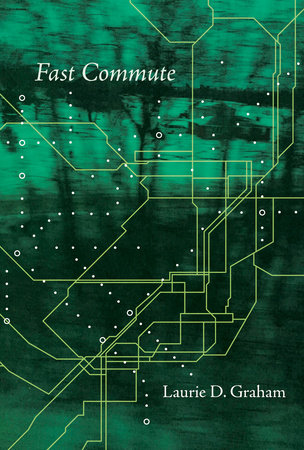There is a grid on the cover, repeated on the opening pages of Laurie D. Graham’s Fast Commute—a grid of city stops and computer / commuter hard drives. And these marking lines and dots overlap with Deleuze’s and Guattari’s philosophical treatise Nomadology: The War Machine (1986), for both books map destructive migrations. Furthermore, Graham’s shaping and spacing of poems across pages reflect grids, and their forms counter fast commutes with a slower cartography of lament.

The clipped sound of the title recurs in the opening line’s “extinct reverse,” undoing the “hold around the neck of the land,” to un-clutch the sounds of the lines. The opening time frame of North Battleford, Saskatchewan, 1913 soon gives way to other places across the land and other aeons across generations and geology. Another frame—“Aspen rustle, always aspen rustle”—appears near the beginning and end of the volume. As an onomatopoeic refrain, it is arresting, gathering and situating one sound on the grid, witness of the wild, and in opposition to “asphalt pathologies”
One of Graham’s major tropes is grasping—whether grasping the past with its colonial and Indigenous implications or grasping the changes to the landscape under the onslaught of modernization. Fast Commute combines the grasp of nature and human nature, the poet mediating between the two: “It’s another hold around the neck of the land / that says I am and will be.” Nature and machinery are both caught up in Graham’s grasp: “Hawk precarious on a fencepost / as the grabbing machine.” These talons perched on liminal sites are less tenacious than the machinery that destroys trees “before a backdrop of extinction.”
In the midst of so much destruction, the poet seeks a place and a home: “vines choking trunks is the story of settlement.” To grasp a place may be unsettling, both for Indigeneity and the environment. The poet’s “slow stabs of thought,” her conscience, have to contend with “the roots with less and less to hold on to.” While developers seize the day, the poet holds history, nature, and humanity. In a photo she sees six men “holding a calf down with their boots.” Branding serves as a form of grasping identity.
Opposed to the cowboys’ branding of horses, cattle, and dirty graffiti is the poet’s Ukrainian inheritance of painting eggs. Against grids and fast commutes, she slowly creates “A kistka and beeswax and an emptied egg, these grabbed-back materials.” She grabs pisanka dye out of black walnuts; she writes “pysanky,” in Cyrillic, “ya pyshoo pysanky,” the Kistka’s lines unending: “I write poems, gardens, eggs.” On the one hand, she memorizes “misâskwatômin” and speaks “nêhiyawêwin”; on the other, she cites the Ukrainian “zmeeya,” the serpent that stalks the earth counting eggs. Bilingual and ambidextrous, Graham joins Indigenous and immigrant experiences, and grasps a Canadian vastness—“the wide sweep of arms mapped / over forest floor.”
She makes extensive lists for listening, for “listening can be your home.” Graham’s ear grasps onomatopoeia, synaesthesia, “Cacophony of headlight,” kaleidoscopic silences, emphatic and empathic propulsion through long migrations, and Deleuze’s settlers’ machine that displaces forest and agriculture. Against the flux of this century, Graham arrests time in her lyrical ecopoetics.
Bios
Michael Greenstein
Michael Greenstein has taught at the Université de Sherbrooke and the University of Toronto. He is the author of Third Solitudes: Tradition and Discontinuity in Jewish-Canadian Literature and the Poetry Editor of The Miramichi Reader. [updated in 2022]

